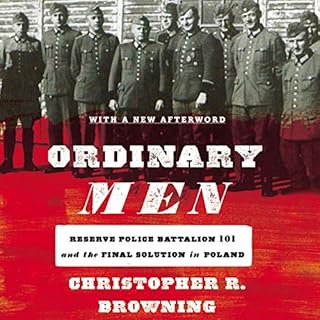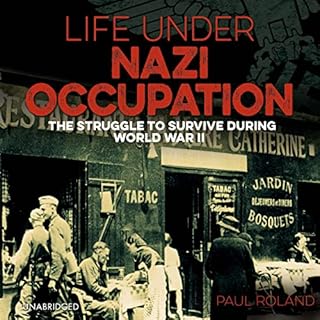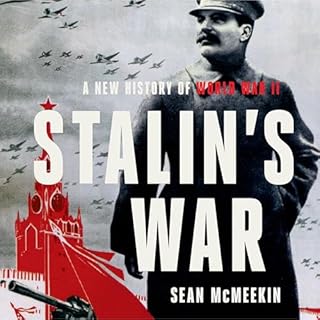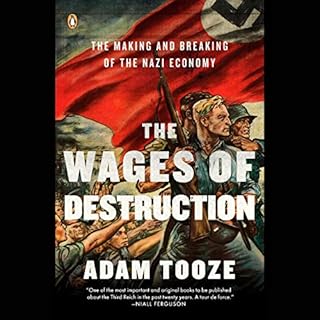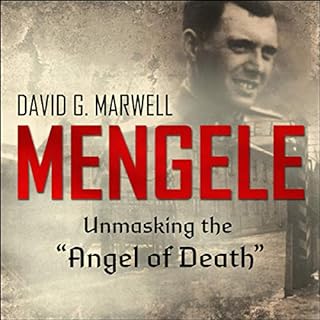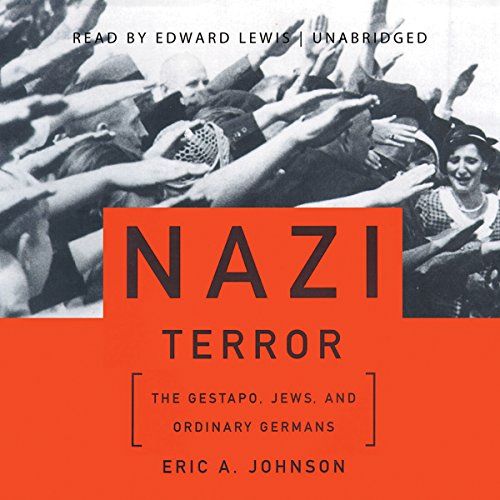
Nazi Terror
The Gestapo, Jews, and Ordinary Germans
No se pudo agregar al carrito
Add to Cart failed.
Error al Agregar a Lista de Deseos.
Error al eliminar de la lista de deseos.
Error al añadir a tu biblioteca
Error al seguir el podcast
Error al dejar de seguir el podcast
$0.99/mes por los primeros 3 meses
 Exclusivo para miembros Prime: ¿Nuevo en Audible?
Exclusivo para miembros Prime: ¿Nuevo en Audible?Obtén 2 audiolibros gratis con tu prueba.
Compra ahora por $21.80
No default payment method selected.
We are sorry. We are not allowed to sell this product with the selected payment method
-
Narrado por:
-
Edward Lewis
-
De:
-
Eric A. Johnson
Acerca de esta escucha
Who were the Gestapo officers? Were they merely banal paper shufflers, or were they recognizably evil? Were they motivated by an eliminationist anti-Semitism? Did the average German know about the mass murder of Jews and other undesirables while they were happening? Exactly how was Nazi terror applied in the daily lives of ordinary Jews and Germans? Eric A. Johnson answers these questions as he explores the roles of the individual and of society in making terror work.
Based on years of research in Gestapo archives as well as extensive interviews with perpetrators and victims, Nazi Terror settles many nagging questions about who, exactly, was responsible for what, who knew what, and when they knew it. It is the most fine-grained portrait we may ever have of the mechanism of terror in a dictatorship.
Destined to become the classic study of terror in the Nazi dictatorship, and the benchmark for the next generation of Nazi and Holocaust scholarship, Nazi Terror tackles the central aspect of the Nazi dictatorship head on by focusing on the roles of the individual and of society in making terror work.
©1999 Eric A. Johnson (P)2000 Blackstone Audio, Inc.Los oyentes también disfrutaron...
-
The Nazi Seizure of Power (Revised Edition)
- The Experience of a Single German Town, 1922-1945
- De: William Sheridan Allen
- Narrado por: Tom Beyer
- Duración: 16 h y 58 m
- Versión completa
-
General5 out of 5 stars 5
-
Narración:5 out of 5 stars 3
-
Historia5 out of 5 stars 3
In this classic work of twentieth-century history, William Sheridan Allen demonstrates how dictatorship subtly surmounted democracy in Germany and how the Nazi seizure of power encroached from below. Relying upon legal records and interviews with primary sources, Allen dissects Northeim, Germany with microscopic precision to depict the transformation of a sleepy town to a Nazi stronghold. This cogent analysis argues that Hitler rose to power primarily through democratic tactics that incited localized support rather than through violent means.
-
5 out of 5 stars
-
A must read in the era of Trump
- De Samuel M. Rector en 06-15-24
-
Ordinary Men
- Reserve Police Battalion 101 and the Final Solution in Poland
- De: Christopher R. Browning
- Narrado por: Kevin Gallagher
- Duración: 10 h
- Versión completa
-
General4.5 out of 5 stars 1,862
-
Narración:5 out of 5 stars 1,551
-
Historia4.5 out of 5 stars 1,539
Ordinary Men is the true story of Reserve Police Battalion 101 of the German Order Police, which was responsible for mass shootings as well as round-ups of Jewish people for deportation to Nazi death camps in Poland in 1942. Browning argues that most of the men of RPB 101 were not fanatical Nazis but, rather, ordinary middle-aged, working-class men who committed these atrocities out of a mixture of motives, including the group dynamics of conformity, deference to authority, role adaptation, and the altering of moral norms to justify their actions.
-
3 out of 5 stars
-
could've done without the afterword...
- De Andrew lester en 06-07-20
-
Empire of Destruction
- A History of Nazi Mass Killing
- De: Alex J. Kay
- Narrado por: Tom Lawrence
- Duración: 14 h y 56 m
- Versión completa
-
General4.5 out of 5 stars 10
-
Narración:5 out of 5 stars 9
-
Historia5 out of 5 stars 9
Nazi Germany killed approximately 13 million civilians and other noncombatants in deliberate policies of mass murder, overwhelmingly during the war years. Almost half the victims were Jewish, systematically destroyed in the Holocaust, the core of the Nazis’ pan-European racial purification program. Alex Kay argues that the genocide of European Jewry can also be examined in the wider context of Nazi mass killing.
-
5 out of 5 stars
-
Detailed, compelling. Shocking. One of the best I’m aware of on the topic.
- De Anonymous User en 11-11-23
De: Alex J. Kay
-
Life Under Nazi Occupation
- The Struggle to Survive During World War II
- De: Paul Roland
- Narrado por: Richard Trinder
- Duración: 7 h y 39 m
- Versión completa
-
General4.5 out of 5 stars 3
-
Narración:5 out of 5 stars 1
-
Historia5 out of 5 stars 1
When the Nazis invaded, they did not intend to govern fairly. Instead, they stripped defeated nations of their treasures, industry, and natural resources, with the aim of asserting German supremacy and imposing Hitler's New Order in Europe.
De: Paul Roland
-
Inside the Gas Chambers
- Eight Months in the Sonderkommando of Auschwitz
- De: Shlomo Venezia
- Narrado por: Peter Noble
- Duración: 7 h y 6 m
- Versión completa
-
General5 out of 5 stars 93
-
Narración:5 out of 5 stars 85
-
Historia5 out of 5 stars 84
Slomo Venezia was born into a poor Jewish-Italian community living in Thessaloniki, Greece. At first, the occupying Italians protected his family; but when the Germans invaded, the Venezias were deported to Auschwitz. His mother and sisters disappeared on arrival, and he learned, at first with disbelief, that they had almost certainly been gassed. Given the chance to earn a little extra bread, he agreed to become a 'Sonderkommando', without realizing what this entailed.
-
5 out of 5 stars
-
Excellent book
- De Rodney en 03-14-23
De: Shlomo Venezia
-
Stalin
- The Court of the Red Tsar
- De: Simon Sebag Montefiore
- Narrado por: Jonathan Aris
- Duración: 27 h y 50 m
- Versión completa
-
General5 out of 5 stars 1,010
-
Narración:5 out of 5 stars 858
-
Historia4.5 out of 5 stars 856
In a seamless meshing of exhaustive research, brilliant synthesis and narrative élan, Simon Sebag Montefiore chronicles the life and lives of Stalin’s court from the time of his acclamation as “leader” in 1929, five years after Lenin’s death, until his own death in 1953 at the age of 73. Through the lens of personality - Stalin’s as well as those of his most notorious henchmen, Molotov, Beria and Yezhov among them - the author sheds new light on the oligarchy that attempted to create a new world by exterminating the old.
-
5 out of 5 stars
-
Stalinist Tyranny
- De Kindle Customer en 12-28-19
-
The Nazi Seizure of Power (Revised Edition)
- The Experience of a Single German Town, 1922-1945
- De: William Sheridan Allen
- Narrado por: Tom Beyer
- Duración: 16 h y 58 m
- Versión completa
-
General5 out of 5 stars 5
-
Narración:5 out of 5 stars 3
-
Historia5 out of 5 stars 3
In this classic work of twentieth-century history, William Sheridan Allen demonstrates how dictatorship subtly surmounted democracy in Germany and how the Nazi seizure of power encroached from below. Relying upon legal records and interviews with primary sources, Allen dissects Northeim, Germany with microscopic precision to depict the transformation of a sleepy town to a Nazi stronghold. This cogent analysis argues that Hitler rose to power primarily through democratic tactics that incited localized support rather than through violent means.
-
5 out of 5 stars
-
A must read in the era of Trump
- De Samuel M. Rector en 06-15-24
-
Ordinary Men
- Reserve Police Battalion 101 and the Final Solution in Poland
- De: Christopher R. Browning
- Narrado por: Kevin Gallagher
- Duración: 10 h
- Versión completa
-
General4.5 out of 5 stars 1,862
-
Narración:5 out of 5 stars 1,551
-
Historia4.5 out of 5 stars 1,539
Ordinary Men is the true story of Reserve Police Battalion 101 of the German Order Police, which was responsible for mass shootings as well as round-ups of Jewish people for deportation to Nazi death camps in Poland in 1942. Browning argues that most of the men of RPB 101 were not fanatical Nazis but, rather, ordinary middle-aged, working-class men who committed these atrocities out of a mixture of motives, including the group dynamics of conformity, deference to authority, role adaptation, and the altering of moral norms to justify their actions.
-
3 out of 5 stars
-
could've done without the afterword...
- De Andrew lester en 06-07-20
-
Empire of Destruction
- A History of Nazi Mass Killing
- De: Alex J. Kay
- Narrado por: Tom Lawrence
- Duración: 14 h y 56 m
- Versión completa
-
General4.5 out of 5 stars 10
-
Narración:5 out of 5 stars 9
-
Historia5 out of 5 stars 9
Nazi Germany killed approximately 13 million civilians and other noncombatants in deliberate policies of mass murder, overwhelmingly during the war years. Almost half the victims were Jewish, systematically destroyed in the Holocaust, the core of the Nazis’ pan-European racial purification program. Alex Kay argues that the genocide of European Jewry can also be examined in the wider context of Nazi mass killing.
-
5 out of 5 stars
-
Detailed, compelling. Shocking. One of the best I’m aware of on the topic.
- De Anonymous User en 11-11-23
De: Alex J. Kay
-
Life Under Nazi Occupation
- The Struggle to Survive During World War II
- De: Paul Roland
- Narrado por: Richard Trinder
- Duración: 7 h y 39 m
- Versión completa
-
General4.5 out of 5 stars 3
-
Narración:5 out of 5 stars 1
-
Historia5 out of 5 stars 1
When the Nazis invaded, they did not intend to govern fairly. Instead, they stripped defeated nations of their treasures, industry, and natural resources, with the aim of asserting German supremacy and imposing Hitler's New Order in Europe.
De: Paul Roland
-
Inside the Gas Chambers
- Eight Months in the Sonderkommando of Auschwitz
- De: Shlomo Venezia
- Narrado por: Peter Noble
- Duración: 7 h y 6 m
- Versión completa
-
General5 out of 5 stars 93
-
Narración:5 out of 5 stars 85
-
Historia5 out of 5 stars 84
Slomo Venezia was born into a poor Jewish-Italian community living in Thessaloniki, Greece. At first, the occupying Italians protected his family; but when the Germans invaded, the Venezias were deported to Auschwitz. His mother and sisters disappeared on arrival, and he learned, at first with disbelief, that they had almost certainly been gassed. Given the chance to earn a little extra bread, he agreed to become a 'Sonderkommando', without realizing what this entailed.
-
5 out of 5 stars
-
Excellent book
- De Rodney en 03-14-23
De: Shlomo Venezia
-
Stalin
- The Court of the Red Tsar
- De: Simon Sebag Montefiore
- Narrado por: Jonathan Aris
- Duración: 27 h y 50 m
- Versión completa
-
General5 out of 5 stars 1,010
-
Narración:5 out of 5 stars 858
-
Historia4.5 out of 5 stars 856
In a seamless meshing of exhaustive research, brilliant synthesis and narrative élan, Simon Sebag Montefiore chronicles the life and lives of Stalin’s court from the time of his acclamation as “leader” in 1929, five years after Lenin’s death, until his own death in 1953 at the age of 73. Through the lens of personality - Stalin’s as well as those of his most notorious henchmen, Molotov, Beria and Yezhov among them - the author sheds new light on the oligarchy that attempted to create a new world by exterminating the old.
-
5 out of 5 stars
-
Stalinist Tyranny
- De Kindle Customer en 12-28-19
-
Prisoners of the Castle
- An Epic Story of Survival and Escape from Colditz, the Nazis' Fortress Prison
- De: Ben Macintyre
- Narrado por: Ben Macintyre
- Duración: 13 h y 25 m
- Versión completa
-
General4.5 out of 5 stars 419
-
Narración:5 out of 5 stars 356
-
Historia5 out of 5 stars 357
In this gripping narrative, Ben Macintyre tackles one of the most famous prison stories in history and makes it utterly his own. During World War II, the German army used the towering Colditz Castle to hold the most defiant Allied prisoners. For four years, these prisoners of the castle tested its walls and its guards with ingenious escape attempts that would become legend. But as Macintyre shows, the story of Colditz was about much more than escape.
-
5 out of 5 stars
-
Another chapter of history brought to life by a master
- De Steve en 09-28-22
De: Ben Macintyre
-
On the Run in Nazi Berlin
- A Memoir
- De: Bert Lewyn, Bev Saltzman Lewyn - contributor
- Narrado por: Jonathan Davis, Suzanne Toren
- Duración: 12 h y 50 m
- Versión completa
-
General5 out of 5 stars 344
-
Narración:5 out of 5 stars 312
-
Historia5 out of 5 stars 308
Berlin, 1942. The Gestapo arrest 18-year-old Bert Lewyn and his parents, sending the latter to their deaths and Bert to work in a factory making guns for the Nazi war effort. Miraculously tipped off the morning the Gestapo round up all the Jews who work in the factories, Bert goes underground. He finds shelter sometimes with compassionate civilians, sometimes with people who find his skills useful and sometimes in the cellars of bombed-out buildings.
-
5 out of 5 stars
-
NOT YOUR USUAL STORY ABOUT THE NAZIS...FANTASTIC!
- De Steve en 03-21-19
De: Bert Lewyn, y otros
-
Russia at War, 1941–1945
- A History
- De: Alexander Werth, Nicolas Werth - foreword
- Narrado por: Derek Perkins
- Duración: 38 h y 27 m
- Versión completa
-
General5 out of 5 stars 94
-
Narración:5 out of 5 stars 85
-
Historia5 out of 5 stars 84
In 1941, Russian-born British journalist Alexander Werth observed the unfolding of the Soviet-German conflict with his own eyes. What followed was the widely acclaimed book, Russia at War, first printed in 1964. At once a history of facts, a collection of interviews, and a document of the human condition, Russia at War is a stunning, modern classic that chronicles the savagery and struggles on Russian soil during the most incredible military conflict in modern history.
-
5 out of 5 stars
-
Simply Astonishing
- De Nicholas Robinson en 02-28-22
De: Alexander Werth, y otros
-
Stalin's War
- A New History of World War II
- De: Sean McMeekin
- Narrado por: Kevin Stillwell
- Duración: 24 h y 56 m
- Versión completa
-
General4.5 out of 5 stars 613
-
Narración:5 out of 5 stars 529
-
Historia4.5 out of 5 stars 527
World War II endures in the popular imagination as a heroic struggle between good and evil, with villainous Hitler driving its events. But Hitler was not in power when the conflict erupted in Asia. His armies did not fight in multiple theaters, his empire did not span the Eurasian continent, and he did not inherit any of the spoils of war. That central role belonged to Joseph Stalin. Drawing on ambitious new research in Soviet, European, and US archives, Stalin’s War revolutionizes our understanding of this global conflict by moving its epicenter to the east.
-
5 out of 5 stars
-
Sean McMeekin Does It Again!
- De Stephen F (SPFJR) en 04-21-21
De: Sean McMeekin
-
The Wages of Destruction
- The Making and Breaking of the Nazi Economy
- De: Adam Tooze
- Narrado por: Adam Tooze, Simon Vance
- Duración: 30 h y 19 m
- Versión completa
-
General5 out of 5 stars 335
-
Narración:5 out of 5 stars 289
-
Historia5 out of 5 stars 287
An extraordinary mythology has grown up around the Third Reich that hovers over political and moral debate even today. Adam Tooze's controversial book challenges the conventional economic interpretations of that period.
-
5 out of 5 stars
-
Ties the story together in an amazing way
- De Philo en 08-23-21
De: Adam Tooze
-
The Nuremberg Interviews
- An American Psychiatrist's Conversations with the Defendants and Witnesses
- De: Leon Goldensohn, Robert Gellately
- Narrado por: Noah Michael Levine, Joshua Kane
- Duración: 19 h y 16 m
- Versión completa
-
General4.5 out of 5 stars 61
-
Narración:4.5 out of 5 stars 47
-
Historia4.5 out of 5 stars 47
The Nuremberg Interviews reveals the chilling innermost thoughts of the former Nazi officials under indictment at the famous postwar trial. The architects of one of history’s greatest atrocities speak out about their lives, their careers in the Nazi Party, and their views on the Holocaust. Their reflections are recorded in a set of interviews conducted by a US Army psychiatrist. Dr. Leon Goldensohn was entrusted with monitoring the mental health of the two dozen German leaders charged with carrying out genocide, as well as that of many of the defense and prosecution witnesses.
-
3 out of 5 stars
-
Interesting
- De John & Becky en 02-17-22
De: Leon Goldensohn, y otros
-
The War Against the Jews
- 1933-1945
- De: Lucy S. Dawidowicz
- Narrado por: Suzanne Toren
- Duración: 23 h y 29 m
- Versión completa
-
General4.5 out of 5 stars 23
-
Narración:5 out of 5 stars 18
-
Historia4.5 out of 5 stars 18
Lucy Dawidowicz's groundbreaking The War Against the Jews inspired waves of both acclaim and controversy upon its release in 1975. Dawidowicz argues that genocide was, to the Nazis, as central a war goal as conquering Europe, and was made possible by a combination of political, social, and technological factors. She explores the full history of Hitler's "Final Solution", from the rise of anti-Semitism to the creation of Jewish ghettos to the brutal tactics of mass murder employed by the Nazis.
-
5 out of 5 stars
-
Brilliant and important
- De Tad Davis en 11-03-21
-
Nazi Women
- The Attraction of Evil
- De: Paul Roland
- Narrado por: Gabrielle Glaister
- Duración: 7 h y 43 m
- Versión completa
-
General4.5 out of 5 stars 75
-
Narración:4.5 out of 5 stars 67
-
Historia4.5 out of 5 stars 67
After the failure of the Weimar Republic, the Nazis believed their mission was to "masculinize" life in Germany. Hermann Goering told women, "Take a pot, a dustpan and a broom, and marry a man", but many still became active participants in murder and mayhem. From the Reich Bride Schools through the Bund Deutscher Mädel and the bizarre Lebensborn Aryan breeding programme to the brothels of the Sicherheitsdienst, this book covers the lives of women in the Third Reich, concentrating on those who sought personal power and influence amid the chaos.
-
3 out of 5 stars
-
People are human
- De Stephen H en 07-04-18
De: Paul Roland
-
The Rise and Fall of the Third Reich
- A History of Nazi Germany
- De: William L. Shirer
- Narrado por: Grover Gardner
- Duración: 57 h y 11 m
- Versión completa
-
General5 out of 5 stars 17,953
-
Narración:5 out of 5 stars 15,490
-
Historia5 out of 5 stars 15,423
Since its publication in 1960, William L. Shirer’s monumental study of Hitler’s German empire has been widely acclaimed as the definitive record of the 20th century’s blackest hours. The Rise and Fall of the Third Reich offers an unparalleled and thrillingly told examination of how Adolf Hitler nearly succeeded in conquering the world. With millions of copies in print around the globe, it has attained the status of a vital and enduring classic.
-
5 out of 5 stars
-
Held my interest for 57 hours and 13 minutes
- De Jonnie en 11-08-10
-
Hitler’s Monsters
- A Supernatural History of the Third Reich
- De: Eric Kurlander
- Narrado por: Grover Gardner
- Duración: 18 h y 18 m
- Versión completa
-
General4 out of 5 stars 149
-
Narración:4.5 out of 5 stars 123
-
Historia4 out of 5 stars 124
The Nazi fascination with the occult is legendary, yet today it is often dismissed as Himmler's personal obsession or wildly overstated for its novelty. Preposterous though it was, however, supernatural thinking was inextricable from the Nazi project. The regime enlisted astrology and the paranormal, paganism, Indo-Aryan mythology, witchcraft, miracle weapons, and the lost kingdom of Atlantis in reimagining German politics and society and recasting German science and religion.
-
5 out of 5 stars
-
sobering
- De Nicholas Monco en 10-27-17
De: Eric Kurlander
-
The Coming of the Third Reich
- De: Richard J. Evans
- Narrado por: Sean Pratt
- Duración: 21 h y 11 m
- Versión completa
-
General4.5 out of 5 stars 2,188
-
Narración:4.5 out of 5 stars 1,724
-
Historia4.5 out of 5 stars 1,724
There is no story in 20th-century history more important to understand than Hitler’s rise to power and the collapse of civilization in Nazi Germany. With The Coming of the Third Reich, Richard Evans, one of the world’s most distinguished historians, has written the definitive account for our time.
-
5 out of 5 stars
-
Compelling and depressing
- De Tad Davis en 06-30-10
De: Richard J. Evans
-
Mengele
- Unmasking the "Angel of Death"
- De: David G. Marwell
- Narrado por: Paul Woodson
- Duración: 11 h y 34 m
- Versión completa
-
General4.5 out of 5 stars 79
-
Narración:4.5 out of 5 stars 74
-
Historia4 out of 5 stars 73
Mengele describes the international search for the Nazi doctor in 1985 that ended in a cemetery in Sao Paulo, Brazil, and the dogged forensic investigation that produced overwhelming evidence that Mengele had died - but failed to convince those who, arguably, most wanted him dead. This is the riveting story of science without limits, escape without freedom, and resolution without justice.
-
3 out of 5 stars
-
A Good Lesson in Historical Investigative Techniques
- De PCMusicGadgetMan en 06-30-20
De: David G. Marwell
Reseñas de la Crítica
Relacionado con este tema
-
The Art of War
- De: Sun Tzu
- Narrado por: Aidan Gillen
- Duración: 1 h y 7 m
- Versión completa
-
General4.5 out of 5 stars 41,637
-
Narración:4.5 out of 5 stars 34,492
-
Historia4.5 out of 5 stars 34,073
The 13 chapters of The Art of War, each devoted to one aspect of warfare, were compiled by the high-ranking Chinese military general, strategist, and philosopher Sun-Tzu. In spite of its battlefield specificity, The Art of War has found new life in the modern age, with leaders in fields as wide and far-reaching as world politics, human psychology, and corporate strategy finding valuable insight in its timeworn words.
-
5 out of 5 stars
-
The actual book The Art of War, not a commentary
- De Nemo71 en 12-31-19
De: Sun Tzu
-
The Real Life of a Roman Gladiator
- De: Alexander Mariotti, The Great Courses
- Narrado por: Alexander Mariotti
- Duración: 2 h y 30 m
- Grabación Original
-
General4 out of 5 stars 77
-
Narración:4.5 out of 5 stars 66
-
Historia4 out of 5 stars 66
The Roman gladiator has long been a figure of fascination. Portrayed frequently in fine art and popular culture alike, the gladiator is both a real part of history and a legend of a romanticized past. We know that these men entertained Roman audiences by fighting in dangerous and often deadly games. But who were the gladiators? What were their lives like? And why do they continue to have such a strong hold on our imagination, centuries after the fall of the Roman Empire?
-
5 out of 5 stars
-
A great overview of the gladiators
- De The Quilted Wayfarers en 11-26-24
De: Alexander Mariotti, y otros
-
Genghis Khan and the Making of the Modern World
- De: Jack Weatherford
- Narrado por: Jonathan Davis, Jack Weatherford
- Duración: 14 h y 20 m
- Versión completa
-
General4.5 out of 5 stars 19,961
-
Narración:4.5 out of 5 stars 16,505
-
Historia4.5 out of 5 stars 16,501
The Mongol army led by Genghis Khan subjugated more lands and people in 25 years than the Romans did in 400. In nearly every country the Mongols conquered, they brought an unprecedented rise in cultural communication, expanded trade, and a blossoming of civilization.
-
5 out of 5 stars
-
Golden Horde/Platinum Listen
- De Cynthia en 12-11-13
De: Jack Weatherford
-
The Last Days of Cabrini-Green
- De: Ben Austen, Harrison David Rivers
- Narrado por: Ben Austen, Patina Miller, Harry Lennix, y otros
- Duración: 3 h y 32 m
- Grabación Original
-
General4.5 out of 5 stars 225
-
Narración:4.5 out of 5 stars 221
-
Historia4.5 out of 5 stars 221
In 1992, the deadliest year in Chicago’s history, seven-year-old Dantrell Davis was shot and killed in front of his elementary school inside the public housing complex Cabrini-Green. What happened to Dantrell led to a truce among Chicago’s gangs, but it also ignited a national panic about poverty and violence in America’s cities. Dantrell’s name would soon be used to demolish all of Chicago’s high-rise public housing, displacing tens of thousands of low-income families.
-
5 out of 5 stars
-
A Gripping and Necessary Work
- De booklover en 11-24-24
De: Ben Austen, y otros
-
The History of Toys, 1900 to the Present
- De: Chris Byrne, The Great Courses
- Narrado por: Chris Byrne
- Duración: 2 h y 55 m
- Grabación Original
-
General4.5 out of 5 stars 23
-
Narración:4.5 out of 5 stars 17
-
Historia4.5 out of 5 stars 17
Toys and games have long been a part of childhood, but the 20th century saw the rise of an entire industry devoted to the business of play, one that would constantly evolve over the years. In the six lectures of The History of Toys, 1900 to the Present, consultant and toy industry expert Chris Byrne—also known as The Toy Guy®—will take you on a journey through the world of toys from the Edwardian era to our current moment. Beginning with the birth of the mass-market toy industry, you’ll trace the many transformations of toys and our shifting theories of play and childhood development.
-
5 out of 5 stars
-
Well played
- De Filson Family en 01-03-25
De: Chris Byrne, y otros
-
The Autobiography of Malcolm X
- As Told to Alex Haley
- De: Malcolm X, Alex Haley
- Narrado por: Laurence Fishburne
- Duración: 16 h y 52 m
- Versión completa
-
General5 out of 5 stars 12,522
-
Narración:5 out of 5 stars 11,139
-
Historia5 out of 5 stars 11,080
Experience a bold take on this classic autobiography as it’s performed by Oscar-nominated Laurence Fishburne. In this searing classic autobiography, originally published in 1965, Malcolm X, the Muslim leader, firebrand, and Black empowerment activist, tells the extraordinary story of his life and the growth of the Human Rights movement. His fascinating perspective on the lies and limitations of the American dream and the inherent racism in a society that denies its non-White citizens the opportunity to dream, gives extraordinary insight into the most urgent issues of our own time.
-
4 out of 5 stars
-
it's Nearly perfect
- De Kerry en 09-16-20
De: Malcolm X, y otros
-
The Art of War
- De: Sun Tzu
- Narrado por: Aidan Gillen
- Duración: 1 h y 7 m
- Versión completa
-
General4.5 out of 5 stars 41,637
-
Narración:4.5 out of 5 stars 34,492
-
Historia4.5 out of 5 stars 34,073
The 13 chapters of The Art of War, each devoted to one aspect of warfare, were compiled by the high-ranking Chinese military general, strategist, and philosopher Sun-Tzu. In spite of its battlefield specificity, The Art of War has found new life in the modern age, with leaders in fields as wide and far-reaching as world politics, human psychology, and corporate strategy finding valuable insight in its timeworn words.
-
5 out of 5 stars
-
The actual book The Art of War, not a commentary
- De Nemo71 en 12-31-19
De: Sun Tzu
-
The Real Life of a Roman Gladiator
- De: Alexander Mariotti, The Great Courses
- Narrado por: Alexander Mariotti
- Duración: 2 h y 30 m
- Grabación Original
-
General4 out of 5 stars 77
-
Narración:4.5 out of 5 stars 66
-
Historia4 out of 5 stars 66
The Roman gladiator has long been a figure of fascination. Portrayed frequently in fine art and popular culture alike, the gladiator is both a real part of history and a legend of a romanticized past. We know that these men entertained Roman audiences by fighting in dangerous and often deadly games. But who were the gladiators? What were their lives like? And why do they continue to have such a strong hold on our imagination, centuries after the fall of the Roman Empire?
-
5 out of 5 stars
-
A great overview of the gladiators
- De The Quilted Wayfarers en 11-26-24
De: Alexander Mariotti, y otros
-
Genghis Khan and the Making of the Modern World
- De: Jack Weatherford
- Narrado por: Jonathan Davis, Jack Weatherford
- Duración: 14 h y 20 m
- Versión completa
-
General4.5 out of 5 stars 19,961
-
Narración:4.5 out of 5 stars 16,505
-
Historia4.5 out of 5 stars 16,501
The Mongol army led by Genghis Khan subjugated more lands and people in 25 years than the Romans did in 400. In nearly every country the Mongols conquered, they brought an unprecedented rise in cultural communication, expanded trade, and a blossoming of civilization.
-
5 out of 5 stars
-
Golden Horde/Platinum Listen
- De Cynthia en 12-11-13
De: Jack Weatherford
-
The Last Days of Cabrini-Green
- De: Ben Austen, Harrison David Rivers
- Narrado por: Ben Austen, Patina Miller, Harry Lennix, y otros
- Duración: 3 h y 32 m
- Grabación Original
-
General4.5 out of 5 stars 225
-
Narración:4.5 out of 5 stars 221
-
Historia4.5 out of 5 stars 221
In 1992, the deadliest year in Chicago’s history, seven-year-old Dantrell Davis was shot and killed in front of his elementary school inside the public housing complex Cabrini-Green. What happened to Dantrell led to a truce among Chicago’s gangs, but it also ignited a national panic about poverty and violence in America’s cities. Dantrell’s name would soon be used to demolish all of Chicago’s high-rise public housing, displacing tens of thousands of low-income families.
-
5 out of 5 stars
-
A Gripping and Necessary Work
- De booklover en 11-24-24
De: Ben Austen, y otros
-
The History of Toys, 1900 to the Present
- De: Chris Byrne, The Great Courses
- Narrado por: Chris Byrne
- Duración: 2 h y 55 m
- Grabación Original
-
General4.5 out of 5 stars 23
-
Narración:4.5 out of 5 stars 17
-
Historia4.5 out of 5 stars 17
Toys and games have long been a part of childhood, but the 20th century saw the rise of an entire industry devoted to the business of play, one that would constantly evolve over the years. In the six lectures of The History of Toys, 1900 to the Present, consultant and toy industry expert Chris Byrne—also known as The Toy Guy®—will take you on a journey through the world of toys from the Edwardian era to our current moment. Beginning with the birth of the mass-market toy industry, you’ll trace the many transformations of toys and our shifting theories of play and childhood development.
-
5 out of 5 stars
-
Well played
- De Filson Family en 01-03-25
De: Chris Byrne, y otros
-
The Autobiography of Malcolm X
- As Told to Alex Haley
- De: Malcolm X, Alex Haley
- Narrado por: Laurence Fishburne
- Duración: 16 h y 52 m
- Versión completa
-
General5 out of 5 stars 12,522
-
Narración:5 out of 5 stars 11,139
-
Historia5 out of 5 stars 11,080
Experience a bold take on this classic autobiography as it’s performed by Oscar-nominated Laurence Fishburne. In this searing classic autobiography, originally published in 1965, Malcolm X, the Muslim leader, firebrand, and Black empowerment activist, tells the extraordinary story of his life and the growth of the Human Rights movement. His fascinating perspective on the lies and limitations of the American dream and the inherent racism in a society that denies its non-White citizens the opportunity to dream, gives extraordinary insight into the most urgent issues of our own time.
-
4 out of 5 stars
-
it's Nearly perfect
- De Kerry en 09-16-20
De: Malcolm X, y otros
Lo que los oyentes dicen sobre Nazi Terror
Calificaciones medias de los clientesReseñas - Selecciona las pestañas a continuación para cambiar el origen de las reseñas.
-
Total5 out of 5 stars
- David
- 04-07-11
Amazing
The book was great; Johnson incorporates careful research on historical archives in Germany into his work and convincingly overthrows many myths about the interaction between the German people during the second world war and the Gestapo.
The narrator is slightly faster than normal but still slower than a normal person talking. He did a fine job.
Se ha producido un error. Vuelve a intentarlo dentro de unos minutos.
Has calificado esta reseña.
Reportaste esta reseña
esto le resultó útil a 2 personas
-
Total5 out of 5 stars
-
Ejecución4 out of 5 stars
-
Historia5 out of 5 stars
- GEORGE
- 08-22-12
Answered Some Questions For Me
I first learned about the terrible crimes committed by the Nazis when the story of the of the death camps was shown on broadcast television in the late 1950s. I could not then, and still do not understand how the so many people stood around and let this happen, much less assist in the exterminitation of the Jewish and Polish people. Ths book provided some insight and answered many of my quations.
Se ha producido un error. Vuelve a intentarlo dentro de unos minutos.
Has calificado esta reseña.
Reportaste esta reseña
esto le resultó útil a 2 personas
-
Total2 out of 5 stars
- Luc
- 03-24-11
Love the content but narrator is way too fast
I am trying very hard to enjoy this as the subject matter is so intruiging, and the writing is good. My challenge is how 'fast' the narrator speaks. I am seriously looking for a way to slow down the audio over all, otherwise I feel like someone is speed reading and audio books are not so.
See John Lee. If he read this, I would be in bliss. Or if the current gentleman just slowed down.
Sincerely, Not so Speedy I plead thee
Se ha producido un error. Vuelve a intentarlo dentro de unos minutos.
Has calificado esta reseña.
Reportaste esta reseña
esto le resultó útil a 4 personas
-
Total2 out of 5 stars
-
Ejecución1 out of 5 stars
-
Historia2 out of 5 stars
- Anthony
- 05-11-12
Annoying narration and a tedious writing style
What disappointed you about Nazi Terror?
The first hour of the book is excruciating. The topic for this section is how this researcher performed his research and a seemingly endless recitation of other author's works and the conclusions the other authors reached. This book is an academic exercise, not an effort to engage the listener in the narrative. Coupled with the author's tedious style, the narrator has a fast paced monotone that had me fighting to stop until I finally became able to tolerate it enough to get through the book.
Se ha producido un error. Vuelve a intentarlo dentro de unos minutos.
Has calificado esta reseña.
Reportaste esta reseña
esto le resultó útil a 2 personas
-
Total1 out of 5 stars
-
Ejecución1 out of 5 stars
-
Historia1 out of 5 stars
- One Size Fits None
- 04-09-13
History By The Numbers
As to form: the performance of the book is awful. The narrator pauses at the end of each sentence for so long that I sped up the replay to 1.5x, which raised his voice to an amusing pitch but at least kept the story moving. Now as to substance...
You know it's may be a tough go when an author spends an entire foreward thanking his research assistants...every last one of them in all countries...his family...his dogs (OK no dogs). It lasted for probably 15 minutes, based on how close I'd gotten to work while listening. This is when you say to yourself, strap me in, it's gonna get wild.
Or not.
The book itself is just dry. Numbers, numbers, numbers. 1933, 4 denunciations, 2 by strangers; 1935, 3 denunciations, one by a stranger, and on and on (and on). The book becomes very hard to follow. It's a shame. Johnson has done a lot of meticulous, focused research, primarily in Gestapo records for a prominent city, a smaller city, a small town. He's obviously spent years at it, done commendable scholarship and compiled quite a record. You can't really quarrel with the structure of his work. It's thematic. The problem for me is that it's driven not by stories but by tables, which are read out loud periodically. It reminds me of a course I had in grad school where the professor kept trying to tell the story of the Civil War by reciting statistics about the production of pig iron. Historians who recite numbers are only doing part of the job. They're why people hate history. A historian has to tell a story. These were real people with real lives. They drank coffee, they rode the S-bahn, they didn't want to go in on Mondays, they were terrified someone would hear them listening to the BBC. Too much of this book - for me - was letting the numbers speak. The individual stories told were not of much interest.
The exception is at the end of the first part, where he discusses clergy who were persecuted by the Nazis. He glosses over Niemoller and Bonhoeffer, which is refreshing, to tell the story of a pair of Catholic priests. One rebels by attacking the Nazis from the pulpit, and stands up to the Gestapo in such an admirable way it seems even the Nazis had to recognize it. He gets transferred by the Church, and when he keeps talking, the Church packs him off to Chile, and when he still keeps talking, they send him off to some place so far out there in Chile that I'm not sure they've got running water and a printing press so he can keep making trouble. A hero.
The second priest is turned in by the Church for molesting young boys, in a high profile case. The story is told in gut turning detail, which is in the records because the Gestapo were thorough and painstaking with any investigation involving sex, such as between Jewish men and German women. He receives what Johnson describes as "comparatively light sentences" despite incontrovertible evidence from several victims, and eventually ends up in Dachau. Johnson questions whether the Church "did all it could to ease [the] plight" of both men. In the case of Father G, the sex offender, when his behavior is uncovered the Church first sends him off to another post. The second time they notify the Gestapo. Johnson asks, "could [the Church] not have found another solution?" Are you kidding? Noting the priest's eventual death in Dachau, Johnson notes, "after six years of misery, his ordeal was over."
Huh?????
This guy was a child molester. "Misery" and "ordeal"??? After molesting children? I'm not suggesting in the remote that Johnson doesn't think the guy is a despicable pervert, but when did German history suddenly run out of sympathetic victims with heartbreaking stories, so that a historian had to rely on this criminal? He wasn't a consenting adult doing with other consenting adults what is nobody's business but theirs. Hate to wear out the phrase, he was a child molester. Father G is not a case of what Johnson labels persecution, but prosecution - the first example I've ever heard of where Nazi justice was actually justice.
Note I'm only reviewing part one - I'm not bothering with part two.
Se ha producido un error. Vuelve a intentarlo dentro de unos minutos.
Has calificado esta reseña.
Reportaste esta reseña
esto le resultó útil a 1 persona
-
Total2 out of 5 stars
-
Ejecución1 out of 5 stars
-
Historia2 out of 5 stars
- Dave
- 12-09-14
Waste of a credit
What disappointed you about Nazi Terror?
the first 1.5 hours is the author giving the history of how he wrote the book.......then the next hour is telling you what's in the book.........by this time you'll just want to turn it off
What was most disappointing about Eric A. Johnson’s story?
The narration is really bad, and I do mean bad....extremely mono toned
Se ha producido un error. Vuelve a intentarlo dentro de unos minutos.
Has calificado esta reseña.
Reportaste esta reseña
-
Total2 out of 5 stars
- Christian
- 05-26-11
Not very good
The narrator reads too quickly and his delivery is in an awkward high speed monotone without proper sentence pacing. The writing is also questionable, for example, content about Gestapo agents comes out like someone reading the agents' day planner, and quite boring. I would refer an interested listener to William L. Shirer's 'The Rise and Fall of the Third Reich' for a more comprehensive, more engaging, and better referenced book on the subject.
Se ha producido un error. Vuelve a intentarlo dentro de unos minutos.
Has calificado esta reseña.
Reportaste esta reseña
esto le resultó útil a 6 personas




